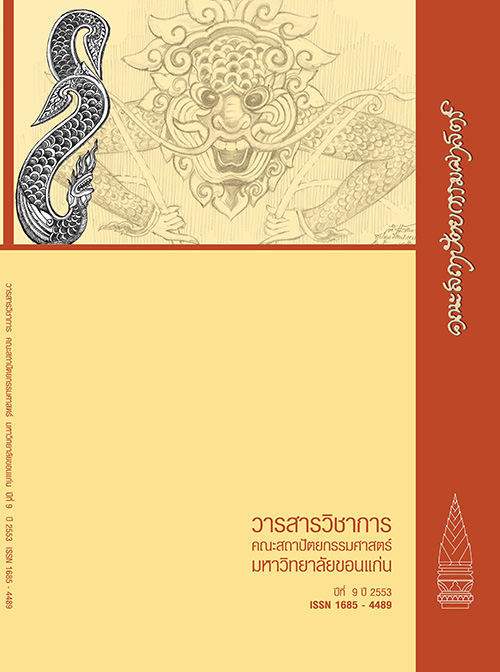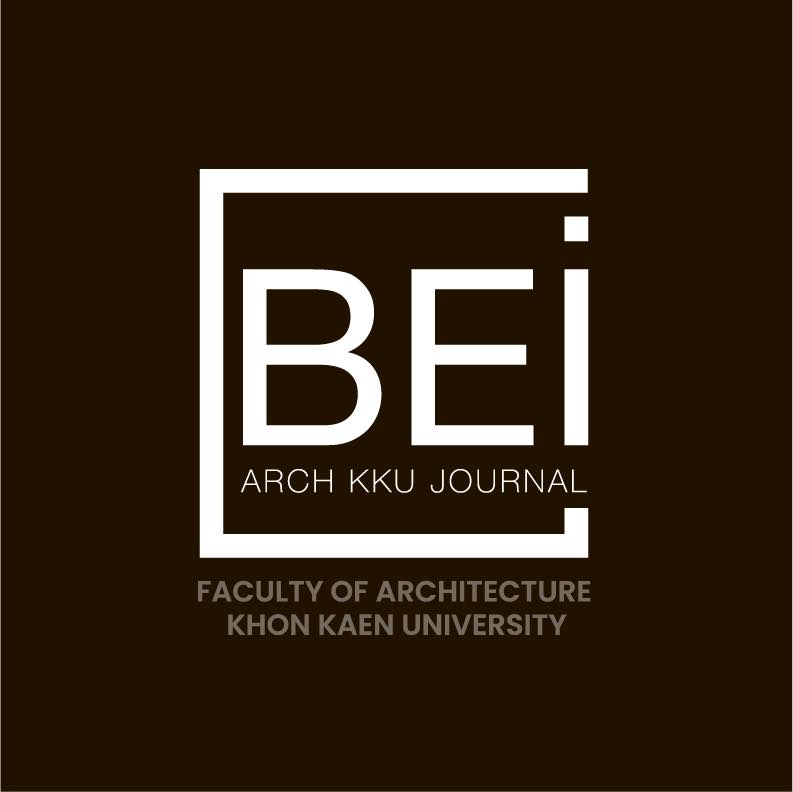คุณภาพชีวิตในชุมชนท่องเที่ยวโฮมสเตย์ กรณีศึกษา โฮมสเตย์บ้านปราสาท อ.โนนสูง จ.นครราชสีมา
คำสำคัญ:
คุณภาพชีวิต, ผลกระทบการท่องเที่ยว, โฮมสเตย์, Quality of life, Tourism development, Home stayบทคัดย่อ
ชุมชนบ้านปราสาท อ.โนนสูง จ.นครราชสีมา ที่ได้รับการพัฒนาให้เป็นชุมชนท่องเที่ยวแบบโฮมสเตย์มาตั้งแต่ปี พ.ศ.2536 และมีการพัฒนาอย่างต่อเนื่องจนมาถึงปัจจุบัน การศึกษานี้เป็นความพยายามที่จะหาคำตอบว่าการพัฒนาการ ท่องเที่ยวแบบโฮมสเตย์นั้นจะส่งผลต่อคุณภาพชีวิตอย่างไร โดยมีวัตถุประสงค์ เพื่อสร้างเกณฑ์ชี้วัดและประเมินคุณภาพชีวิต เพื่อวิเคราะห์องค์ประกอบที่ส่งผลต่อคุณภาพชีวิต เพื่อศึกษาผลกระทบจากการท่องเที่ยวแบบโฮมสเตย์ และเพื่อเสนอแนะแนว ทางพัฒนาการท่องเที่ยวเพื่อการส่งเสริมคุณภาพชีวิตที่เหมาะสมกับชุมชนบ้านปราสาท
การศึกษาคุณภาพชีวิตในชุมชนท่องเที่ยวแบบโฮมสเตย์นี้ มีตัวชี้วัดคุณภาพชีวิต 4 ด้านคือ 1) ด้านสุขภาพ 2) ด้านสังคม 3) ด้านเศรษฐกิจ 4) ด้านสภาพแวดล้อม วิธีการศึกษาใช้แบบสอบถามสัมภาษณ์ประชาชนที่อาศัยอยู่ในชุมชนบ้านปราสาท จำนวน 293 คน และการจัดสัมมนากลุ่มย่อยในชุมชน เพื่อรับฟังข้อความคิดเห็นและข้อเสนอแนะจากชุมชน ผลจากศึกษาพบว่า ประชาชนมีคุณภาพชีวิตด้านสุขภาพ คุณภาพชีวิตด้านสังคม และคุณภาพชีวิตด้านสภาพแวดล้อมอยู่ในระดับสูง ส่วนคุณภาพ ชีวิตด้านเศรษฐกิจอยู่ในระดับปานกลางเท่านั้น แต่เป็นองค์ประกอบที่ส่งผลต่อคุณภาพชีวิตมากที่สุด รองลงมาได้แก่ องค์ประกอบ ด้านสังคม องค์ประกอบด้านสุขภาพ และองค์ประกอบด้านสภาพแวดล้อม ตามลำดับ ในด้านผลกระทบจากการท่องเที่ยวพบว่า กลุ่มตัวอย่างส่วนมากมีความคิดเห็นว่าการท่องเที่ยวส่งผลดีมากกว่าส่งผลเสีย และกลุ่มที่มีส่วนร่วมในการท่องเที่ยวจะมีคุณภาพ ชีวิตที่ดีกว่ากลุ่มที่ไม่มีส่วนร่วมในการท่องเที่ยว ในการพัฒนาการท่องเที่ยวเพื่อส่งเสริมคุณภาพชีวิตนั้น ชุมชนและภาครัฐควรจะ ให้ความสำคัญในการพัฒนาทางด้านเศรษฐกิจ การกระจายรายได้จากการท่องเที่ยวสู่ชมชน และการสร้างความตระหนักให้กับ เยาวชนและกลุ่มบุคคลในวัยทำงานให้เข้ามามีส่วนร่วมในการท่องเที่ยวมากขึ้น
Quality of Life in Homestay Community: A Case Study of Ban Prasat Homestay, Amphoe NonSung, Changwat Nakhon Ratchasima
At present, the quality of life has been considered as the highest priority in developing country. Such policy as tourism development has become a tool for improving the quality of life. This policy is applied to many communities in rural area such as Ban Prasat, Amphoe Nonsung, Changwat Nakhon Ratchasima. The community has been developed as a home stay since 1993. This study aims to investigate how the tourism development, home stay, affects the quality of life. The main objectives of the study are to measure and evaluate the quality of life, to analyze the factors affecting quality of life, and to investigate the impact of home stay development on the community as a whole. The study also aims to provide the suggestion of how to promote tourism development for better quality of life in Ban Prasat. Two hundred and ninety three persons living in the community were interviewed based on four aspects of the quality of life (i.e., health, social, economic, and environmental aspect.) The results indicate that Ban Prasad’ quality of life in all aspects is high, with the exception of economic aspect that is evaluated at medium level. The impact of tourism on the community is rather positive than negative. Moreover, the results show the relation between participation in tourism-related activities and the level of quality of life. People who participate in tourism-related activities tend to have higher quality of life when compare to those who do not. In order to improve Ban Prasat’s quality of life through tourism development, local government and the community should emphasize the economic development especially on how to improve the distribution of tourism generated income within the community. In addition, local government should level up the awareness of community in public participation especially in tourism-related activity by encouraging more participation among the teens and those working the village.
ดาวน์โหลด
รูปแบบการอ้างอิง
ฉบับ
ประเภทบทความ
สัญญาอนุญาต
ทัศนะและข้อคิดเห็นของบทความที่ปรากฏในวารสารฉบับนี้เป็นของผู้เขียนแต่ละท่าน ไม่ถือว่าเป็นทัศนะและความรับผิดชอบของกองบรรณาธิการ




